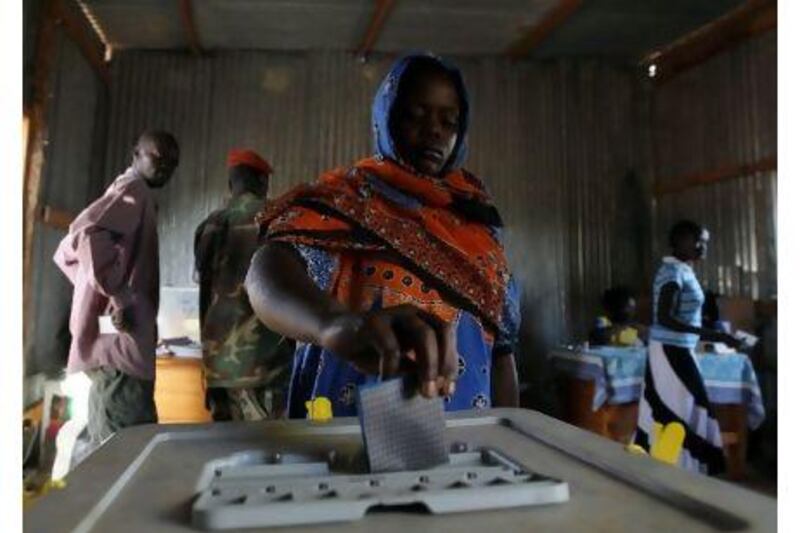KHARTOUM // South Sudan crossed another milestone on its way to possible independence yesterday when officials said the number of people casting ballots reached the 60 per cent turnout threshold required for the vote to be valid.
Ann Itto, an official with the south's ruling Sudan Peoples' Liberation Movement, said nearly 2.3 million voters had cast ballots so far in the week-long vote. The figure has yet to be officially confirmed by the South Sudan Referendum Commission.
There were long queues at polling stations again yesterday, but in contrast to the jubilant mood in the south it appears some in the north are preparing themselves for possible outbreaks of violence.
Fayad al Tayeb, an operations manager for a project management company in Khartoum, lives near Soba. He has heard that if problems arise it will likely start there, where there is a high concentration of polling station.
"For security only, I purchased a gun last week like a few others," said Mr al Tayeb. "It makes me feel safer. Thankfully there's been no violence yet, but we are only in the voting phase. We may see demonstrations in the north because this is a big moment in history. Our country may split and our economy is already seriously damaged," he said.
Awad Abdul Hamid, an event planner, said the government is well equipped to handle any situation and that he does not fear an outbreak of war.
"Yes, people are arming themselves, but only for security reasons. They will not need to use weapons," he said.
At least 33 people were reported to have died in clashes during the weekend in the region of Abyei, which lies on the border between the north and south. Ms Itto accused the government in Khartoum of backing Arab militias in the region.
The Sudanese president, Omar al Bashir, has said he would let the south go peacefully if voters chose to secede, even though it would split Africa's largest country in two and deprive the north of most of its oil fields.
Sudan was embroiled in civil war from 1983 to 2005 - a conflict that killed an estimated two million people - and some in the north feel a new southern state will not want to become involved in another conflict.
"The south will become a new country and they cannot be involved in conflict because this is a test they cannot afford to lose from the beginning," said Nazar Khidir Abdullah, a Khartoum-based entrepreneur. "We in the north fear western countries taking advantage of the south."
The north, he believes, will be able to stand alone economically. "Financial burdens will ease because the north won't have to pump money to the south. Agriculture is booming, we have gold and other resources. Oil found in the north is said to be 100,000 barrels a day, and research shows other areas are being investigated," he said. "An independent south was inevitable no matter who the president is."
Kamal A Elamin, managing director of MH2K and 5th Avenue businesses in Khartoum, is against buying weapons.
"I've not bought a gun because I don't see an agenda for going back to war. If anything happens it might be over Abyei," he said. "We may see raids or demonstrations in the north but the government won't allow violence."
The spokesman for the South Sudan Referendum Committee, George Maker, there is no cause for mounting tensions.
Things are peaceful and the turn out of voters has been great," said Mr Maker, speaking from Juba, where he was monitoring the situation. "The result is the wish of southerners which will be accepted by all."
With additional reporting by the Associated Press and Agence France-Presse





